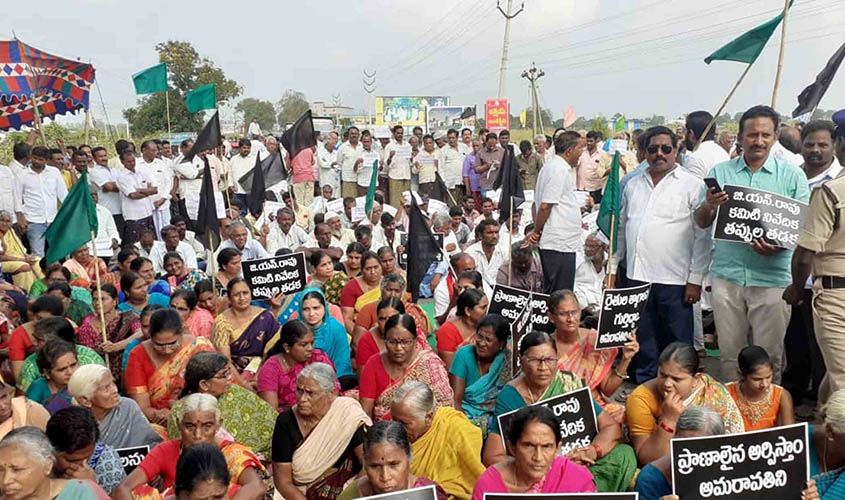Villages surrounding Amaravati are up in arms against Jagan.
Hyderabad: Amidst unabated protests by farmers who gave their lands for Andhra Pradesh capital Amaravati, the Y.S. Jagan Mohan Reddy-led government has appointed a high-powered committee of ministers to decide the fate of the city. Jagan has already decided to shift the capital from Amaravati to a decentralised format where three cites would discharge its functions.
A Cabinet meeting chaired by Jagan on Friday resolved to take into account the protests of thousands of farmers who had offered their lands for the capital city construction five years ago and come up with a comprehensive solution to their grievances. The high-powered committee consisting of ministers and officials would find the solution.
The committee, yet to be appointed, would look into the report of the retired IAS officer G.N. Rao panel, which recommended setting up of three capitals —Amaravati with the legislature, the Governor’s Raj Bhavan and a High Court bench; Visakhapatnam with Secretariat and a High Court bench and Kurnool with the High Court and other judicial officials.
The high-powered committee will also look into another yet to be submitted report of the Boston Consulting Group (BCG), a US-based management agency, on the same topic. The Andhra Pradesh government has hired BCG services three months ago for deciding whether Amaravati can be the capital of the state. The group is expected to submit its final report by January end.
The BCG has indicated its preference for a brown-field capital, means developing an existing city infrastructure for the capital instead of going for a green-field one, developing an altogether new capital city, to save time and money. The reports of both G.N. Rao panel and BCG are in tune with the thinking of the Jagan government which prefers a compact and economy model capital for Andhra Pradesh.
However, already, people of 29 villages surrounding Amaravati are on the agitation path for the last 10 days, since Jagan told the Andhra Pradesh Assembly that there could be three capitals—at Amaravati, Visakhapatnam and Kurnool. These farmers are furious that they had given their fertile lands for the sake of the capital believing that they would get real estate appreciation and lucrative commercial and residential plots.
The previous Chandrababu Naidu-led TDP government has collected their lands—around 33,000 acres—under a land pooling scheme (LPS) where they would get some annual lease amount besides some plots, both residential and commercial, based on the value of the lands. Naidu had claimed that his method of LPS was unique and that it was a model for the entire country.
Ironically, TDP lost the recent Assembly elections not only in the entire state, but also the Mangalagiri seat which covers the capital city region, where Naidu’s son Nara Lokesh, then minister, stood as the party candidate. Here, Jagan’s nominee Alla Ramakrishna Reddy who won always alleged that the farmers were forced to give up their lands, not voluntarily, under the LPS.
Jagan has always been suspicious of Naidu’s Amaravati project for more than one reason: first, that there were large-scale irregularities of insider trading by the TDP government (that the ruling party leaders had purchased vast tracts of lands around the capital city region) and, second, is that the area was not suitable for the city building and, third, that the project requires huge sums of money.
A Cabinet sub-committee headed by Buggana Rajendranath Reddy (finance minister) which submitted its report to the Cabinet on Friday concluded that there was large scale insider trading on Amaravati and some leaders close to the then Chief Minister Naidu had benefitted out of the government’s decision to set up the capital at the present location—between Vijayawada and Guntur cities.
As per the Cabinet panel report, around 4,075 acres of lands were purchased at cheaper rates by the TDP’s ministers, MPs and MLAs and their close family members during the second part of 2014 after the party came to power in June. Naidu has set up a committee led by Minister P. Narayana who recommended the capital to come up at Amaravati, present location, on 31 December 2014.
Jagan’s charge was that Naidu had disregarded an earlier committee led by Sivaramakrishnan, who was appointed by the UPA government at the Centre as per the Andhra Pradesh bifurcation plan in March 2014. That panel had suggested that a green-field capital can come up at Donakonda, a remote area in Prakasam distgrict, in the southern coast of Andhra Pradesh.
Jagan’s contention was that Naidu had opted for Amaravati as it was surrounded by two big cities of Vijayawada and Guntur where TDP leaders had vast business interests. But, Naidu’s argument was that only a mega capital at Amaravati with public and private investments match Hyderabad city, which was lost to Telangana under the Andhra Pradesh bifurcation.
AP Information and Public Relations Minister Perni Nani who briefed the media after Friday’s Cabinet meeting explained that it was not possible to build Amaravati with the meagre government resources; hence Jagan’s government wants to go for brown-field capital elsewhere. “We will take a final decision soon, after the BCG report comes next month,” Nani said.
The minister ridiculed Nadiu’s insistence that Amaravati should be retained as Andhra Pradesh capital. Nani said: “Naidu wanted to build Amaravati over 54,000 acres (including government lands) with an outlay
Though Jagan’s government has deferred a decision on Amaravati to next month, the agitations by farmers are unlikely to subside. The government is expected to take some time before tempers cooled off and a solution acceptable to all is evolved. Jagan is also planning to hold an all-party meeting and a special Assembly session in January-February on this capital conundrum.

